Celebrating UN-Designated Zero Discrimination Day
“Zero discrimination is the cornerstone of world peace.” ~ Dr. Hong, Tao-Tze, president of FOWPAL
March 1 marks the UN-designated Zero Discrimination Day, the Federation of World Peace and Love (FOWPAL) hosted a webinar on March 1, 2022, where visionaries shared their experiences and thoughts about the elimination of discrimination and called on global citizens to work together to promote conscience, tolerance, equality, and peace!
Dr. Hong, Tao-Tze, president of FOWPAL, delivered welcome remarks, emphasizing, “Conscience is righteous and impartial, and it is the balancing force to achieve zero discrimination. People should follow their conscience, maintain positive attitudes, and maintain healthy bodies and minds in order to stabilize themselves, respect others, treat all things with kindness, caring, unity, and cooperate with one another in order to overcome difficulties and pass the trials of the greater environment together. Everyone is a leader of conscience and can lead the world by thinking kind thoughts and creating cycles of goodness. Human rights are natural endowments, and all people are born free and should enjoy dignity and equal rights. Only by achieving ‘zero discrimination’ can we lay the foundation for world peace.”
Dr. Ramesh Kumar, former head and associate professor of the Department of Political Science of S.D. College in India, stated, “All the government organizations must play an effective role and explore as well as expose the corrupt and criminal elements which are creating discrimination, exploitation, and oppression, and action-oriented approach must be adopted by the international agencies as well as state governments or federal governments so that people may live with dignity, and there should be no injustice.”
Rania Lampou, a global STEM educator and the founder of many international projects aimed at achieving sustainable development goals, discussed some of her recent educational projects, including a safe water program in Malawi and the promotion of gender equality and the prevention of gender-based violence in Nigeria. She also spoke about her volunteer work in Greece, where she taught children in refugee camps, students with special needs, and youngsters at an oncological hospital. She emphasized the significance of collaboration at all levels of government and among nations in order to promote tolerance, respect for human rights, gender equality, peace, and other values.
Jeff Schoep, director of Beyond Barriers, shared his transformation from a dehumanizer to an avid advocate for zero discrimination who leads an organization that gets people out of hate groups and extremist organizations. He believes most people have inherent humanity, and his organization is helping dehumanizers reconnect with their humanity. He noted that fostering mutual understanding is critical as hatred and discrimination come from fear and misunderstanding. He emphasized the importance of fostering zero discrimination through education: “The more we can focus on education and teaching our youth, the better future we have for us all in the world.”
Amna BiBi, an educator in Pakistan, talked about her work to promote zero discrimination, equality, and peace, including helping disabled individuals and people with diseases. She stressed that every individual is a member of society and should be treated with respect, honor, and dignity, and that because everyone has feelings, no one should be discriminated against. She has been promoting inclusion, diversity, compassion, and other positive ideals, and she encouraged viewers to do the same, out of a love for mankind and conscience.
Yunus Ibrahim Hussain, an SDGs advocate in Nigeria, said that once he was discouraged to study in Europe simply because of his religion and race. He advocated interfaith and interracial collaboration as well as mutual understanding and respect. There is no development when people hate and discriminate against others, he said, calling for educating a generation of people who are more understanding and tolerant.
Erica Wu, a university student in Argentina, talked about how she was excluded by her classmates during her high school years and how that experience has made her more conscious of how she can avoid unintentionally harming others. “Acting out change requires letting go of one’s ego as a decision to change implies that your past self is wrong,” she said of her transformation into a more tolerant individual. “However, once one can accept one’s mistakes and learn from them instead of ignoring them, one can grow a lot more and become a more inclusive person.”
Josette Lung Ogle, a retired teacher, stated that focusing on differences causes separation and prejudice, whereas focusing on commonalities leads to inclusion, support, and acceptance. When people look past their differences, they are more likely to accept, value, and respect the cultures of others and work with them. She encouraged everyone to work together to make the world a better place for future generations.
FOWPAL also received many other messages in support of this meaningful event, which concluded with an uplifting song titled “The Flag of Conscience,” encouraging people to follow their conscience to move toward a brighter future while working together to protect human rights and create a peaceful world.
Source: FOWPAL
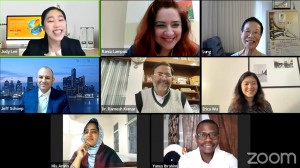
In support of the UN-designated Zero Discrimination Day, FOWPAL hosted a webinar on March 1, 2022, calling on global citizens to unite and cooperate to eradicate discrimination and promote conscience, tolerance, equality, and peace!
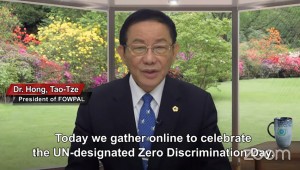
Dr. Hong, Tao-Tze, president of FOWPAL, stated, “Only by achieving ‘zero discrimination’ can we lay the foundation for world peace.”
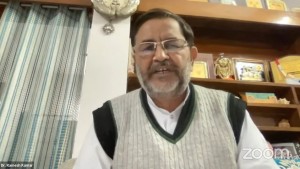
Dr. Ramesh Kumar, former head and associate professor of the Department of Political Science of S.D. College in India, stated that all governments and organizations must take action to ensure that people live with dignity and that there is no injustice.
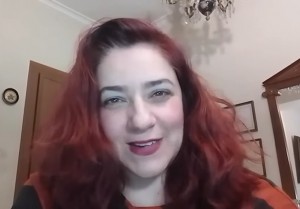
Rania Lampou, a global STEM educator, emphasized the significance of collaboration at all levels of government and among nations in order to promote tolerance, respect for human rights, gender equality, peace, and other values.
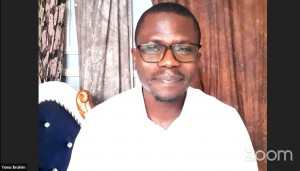
Yunus Ibrahim Hussain, an SDGs advocate in Nigeria, said that there is no development when people hate and discriminate against others.
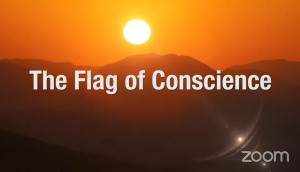
The event concluded with an uplifting song titled “The Flag of Conscience,” encouraging people to follow their conscience to move toward a brighter future while working together to protect human rights and create a peaceful world.



